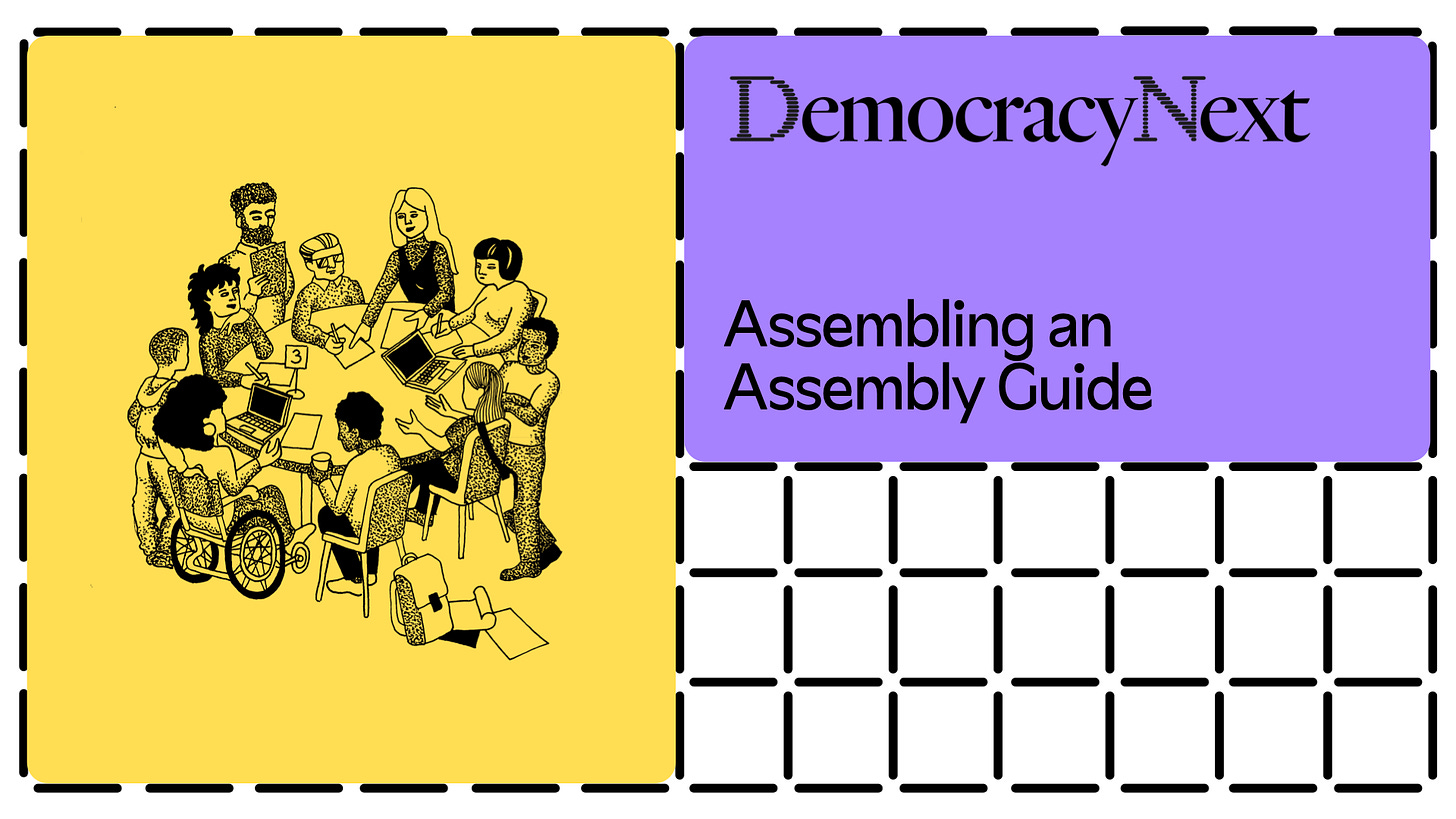How to assemble a Citizens' Assembly: a guide!
Our step-by-step manual to designing a Citizens' Assembly, coming soon to our brand new website
📒 Readers of this newsletter might be familiar with recent Citizens’ Assemblies launched by governments — but did you know that other institutions can apply the core principles of participation, representation by lottery, and deliberation to achieve democratic outcomes? Our goal at DemocracyNext is to not only encourage public authorities from Mexico to Belgium to hold more assemblies, but to reseach and explore how this democratic paradigm can be applied in the economy, urban planning, companies, unions, museums and more.
To that end, we want to share that our new Assembling an Assembly Guide will go live on our website in July—we’re excited about it! This richly detailed, illustrated webpage will walk visitors through the key design elements and principles to run a successful Citizens’ Assembly, and suggest ways for anyone to go about initiating an assembly process and adapting it to one’s own community or context.
In the meantime, we want to hear from you! As we work to finalize this page, we would greatly welcome comments below or messages from readers at ieva@demnext.org to share what questions you have about assemblies and what you would look for in such a guide.
If we do our job right, the Assembling an Assembly Guide will serve as an in-depth resource for people around the world, in much the same way that the OECD Catching the Deliberative Wave report, written by the DemNext founding team, has become a touchstone, translated into multiple languages! They are called Citizens’ Assemblies, after all, because citizens—all of us—are the ones who ultimately must be empowered to co-create (i.e. assemble) them, together.
🏗 In related news, DemocracyNext’s new website is now online! Check it out: http://demnext.org.
Huge thanks to the development team at Berlin-based Village One, who did an oustanding job translating our unique vision into reality. We’re also grateful to French artist Adèle Vivet for her distinctive illustrations of the current and future democratic paradigms, and to studio Yukiko for developing the site design and visual identity.
The DemocracyNext website is organized into the following sections, which we encourage you to explore:
Homepage — an introduction to our mission and latest news, featuring a panoramic illustration from Vivet that can be explored with buttons and pop-ups
About — much more detail on our vision, our values, and the defining principles of the next democratic paradigm
People — a complete list of photos and biographies of our 6-member team, 3 fellows, 3 strategic advisors, and global 13-person International Advisory Board
Projects — descriptions and contacts for our major projects and initaitives:
Events — all of the dates, times and locations for various panels (in-person and virtual) and conferences we’ve joined, including the Urban Future Conference this week
News — the latest press statements from us as an organization, as well as appearances in the media
We’ll continue to publish news and commentary here on Substack of course, but we’re quite happy to have a full-fledged website, so if you like what you see, please share it with your friends, family or colleagues. And stay tuned for the Assembly Guide coming next.
🤖 A must-read on AI: Randomly-selected citizens can and should be utilized now in the efforts to regulate artificial intelligence. But don’t just take our word for it. DemNext Strategic Advisor Hélène Landemore has published an op-ed, co-authored with researcher Andrew Sorota and Taiwan’s Digital Minister Audrey Tang, showing how it is possible:
We believe a global, democratic approach–not an exclusively technocratic one–is the only adequate answer to what is a global political and ethical challenge. Sam Altman himself stated in an earlier interview that in his “dream scenario,” a global deliberation involving all humans would be used to figure out how to govern A.I.
There are already proofs of concept for the various elements that a global, large-scale deliberative process would require in practice. By drawing on these diverse and complementary examples, we can turn this dream into a reality.





The Assembly Guide sounds great, and I'm looking forward to reading it, and thank you for making it open access.
I'd like to know about the costs and skill levels required to run citizen assemblies, and where is the support infrastructure to enable their wider use.
Ideally, for me, citizen assemblies (and other participatory, deliberative practices) should become common practice and something everyone and anyone should have a chance of participating in. However, as I've looked into citizen assemblies it seems the costs and skill levels required, to organise and facilitate, seem high, which may inhibit wider use. As such, I'm curious about how they can be run at a lower cost, by anyone? If that is even possible? How can the practice be more accessible and decentralised?
For example, Trust The People, in the UK, train grassroots community members to facilitate Community Assemblies, which are similar but different from Citizen Assemblies. The Community Assemblies can be run by volunteers at very low costs, and so have the potential to spread further.
As a provocation, are citizen assemblies in danger of becoming a top down, elitist practice, or can they be democratised and decentralised?
Another concern about citizen assemblies, which may or may not be relevant to the new guide, is about the process of choosing and formulating the question, issue, topic to be discussed. Who decides that and how? The framing of a question can narrow or expand the horizon of what is possible in answering it. With Community Assemblies, organised and run by community members, the issues to be addressed are from the bottom up, can the same be said of citizen assemblies?
Lots of questions, curious to hear what others think.
Will the guide be an interactive resource that will continuously improve with readers engagement? It should be.
Could I suggest exploring a Stackexchange forum for Citizens Assemblies? Take a look at https://politics.stackexchange.com to see what I mean.